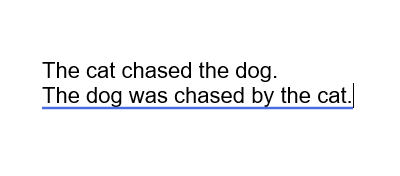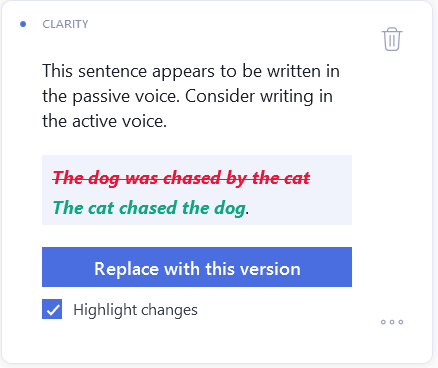If you’ve ever run from the shower to write down an idea or found a quarter in a birthday cake as a kid, you know how some of the best stuff comes out of nowhere.
Writing has been a lot like that for me.
Often, it isn’t lectures, conferences, and courses that have the most impact.
It’s the seemingly insignificant things that help you the most.
Here are seven examples of this theory in action – seven completely unexpected lessons I’ve picked up along the way that have undoubtedly made me a better writer.
I hope they do the same for you!
1. One Question That Makes Your Writing Effective
An older journalist friend asked me this once when discussing a title, and I’ve used it ever since. Here’s how it works:
Every time you sit down to write anything, ask, “So what?” And keep asking that question until you get to the core of what’s in it for the reader.
Advertisement
Continue Reading Below
“It’s a 2022 Mazda MX-5 Miata.” So what?
“Mazda Launched the 2022 MX-5 Miata…” So what?
The final version will depend on your audience and what their priorities are. If you’re talking to academics, your answer will be different from new moms. But the important part is that you find it.
I’ve found that asking myself, “So what?” until I get to the real gem of what it is that actually matters about the topic has made my copy more effective and concise.
And it’s made me a more effective communicator overall.
2. There’s A Secret Formula
If you talk to well-known writers, you’ll find they all have a unique way of approaching the writing process.
And while some operate on feel, others find a formula or strategy and repeat the winning technique, applying it to different contexts.
I’ve found some of my own over the years, but I’ve borrowed a few as well.
Lists are a great example, and they can be created in different ways:
Advertisement
Continue Reading Below
- Visually appealing: From shortest to longest character count.
- Memory-based: Most important listed first. The most remembered item listed last.
- Patterns: Power of 3, the popularity of 7, etc.
- Logical order: Logical or procedural order.
- Decision-making order: Use the anchoring bias to guide decisions (eg.: Placing the product you want to sell most often in the middle.).
But there’s another way.
Several years ago, a popular comedy writer shared some insights into what made Letterman’s top ten lists so successful.
First, he said, was to write each item as a separate joke with a punchline, so it stands on its own. The writers also designed the sixth joke to elicit a more prolonged laugh to give the team a chance to change graphics on the screens.
Are these tips going to result in effective business content? Not exactly. But they taught me to think closely about the functionality of the content.
I pay close attention to how the words appear on the page.
I deliberately arrange lists using processes beyond the standard formulas. And I use content to fill in design or customer journey gaps.
Most importantly, I experiment and test to create formulas that work for a specific audience that I can use for repeated success.
3. Everything You Learned About Writing Is A Lie
Your teachers were busy and would have likely preferred to do anything other than reading your high-school version of a five-paragraph essay.
That’s why schools taught you to demonstrate what you learned in a way that was quick and easy to mark.
But your readers are not your teachers.
Readers don’t want to know about what you learned (usually, anyway), and they’re not trying to grade 50+ papers. So, why would you write the same way for both audiences?
You don’t.
One of the best explanations I’ve ever come across is this. Which one is correct?
 Screenshot from Grammarly.com, November 2021
Screenshot from Grammarly.com, November 2021If you’re writing for a cat website, the first sentence is the right choice.
Advertisement
Continue Reading Below
If you’re speaking to dog lovers, the second is the better answer.
Why? Because dog people care about the dog.
 Screenshot from Grammarly.com, November 2021
Screenshot from Grammarly.com, November 2021If you’re a teacher or traditional writer, you may be a little upset by that. I’m sorry, but it works. When your goal is dollars and not grades, the arbitrary rules of writing created by some 500-year-old dudes are irrelevant.
When we read, we focus on a sentence’s subject and items mentioned first. By adjusting the sentence structure, you can emphasize what’s important to the reader and build a connection.
Advertisement
Continue Reading Below
Keep in mind, however, that you can’t break the rules whenever you feel like it. Context is important.
I am far more likely to break the rules and write more conversationally in a blog post than I am when writing documents for investors.
And if you take the time to understand your audience, you’ll know when, where, and which rules to break.
(Bribing your editor also helps. Ours are wonderful and do an amazing job!)
Editor’s note: Thank you! I’m embarrassingly susceptible to flattery and milk chocolate.
4. Language & Music Need Rhythm
Long before I was a writer, I was a musician.
I learned the power of tension, release, phrasing, and using notes in just the right way to express an idea or tell a story. Soon, I discovered that music was much more than just a story without words.
Music whispers a secret story to the listener’s soul, creating a new world neither the musician nor listener have ever seen.
Advertisement
Continue Reading Below
And scientific research backs this up.
During a concert, the audience’s breathing and physiological responses sync to the music. The musicians’ bodies sync with the music and each other physically, mentally, and physiologically.
The result is a collective moment of communication and a shared experience that is simultaneously the same and different for everyone.
Storytelling can have the same effects.
- Music has notes organized into measures.
- Measures are arranged into phrases.
- And phrases are shaped into themes to tell a story.
- Writing has letters organized into words.
- Words are arranged into sentences.
- Sentences are shaped into paragraphs to tell a story.
Use it. Use your writing to tell a story with tension and release, phrases, themes, and rhythms.
Make it flow in cadences. And if it doesn’t, adjust the wording until it does.
Most importantly, make sure your work has soul – even if you’re only telling the world about some new type of window caulking.
If you’re passionate and excited about what you do, your readers will be, too.
Advertisement
Continue Reading Below
At the very least, you’ll come off as genuine and human. Maybe a little different, but that’s ok, too.
5. Make Sure You’re You
When you listen to enough professional classical musicians, you begin to notice the difference between those who are good at it and those who are instinctually passionate about what they do.
Consider a gymnastics competition. Two competitors can execute the same routine flawlessly, and one will almost always get higher marks.
Why?
While both competitors had a technically correct and sound performance, the one who is truly passionate about the sport will look at the right judge, in the right way, at just the right time.
They point their fingers and flex their toes almost by instinct to create flawless lines with just a little touch of quiet grace that draws in the judge and makes an emotional connection that makes the difference.
Your writing needs that flawlessly pointed toe or well-timed glance.
It needs you, your passion, and your unique voice putting the fine details on the words that will make your connection with the reader.
Advertisement
Continue Reading Below
6. You Can Choose To Be Great
I’m a chronically busy person. I’m always working on something.
And if I’m not working on something, I’m catching up or starting something else. And this works well.
At least, I thought it did.
During one of these “do it all now” moments, a trusted professor and friend told me:
“Stop doing all that other stuff. Focus on what you do best, and it will get easier.
Instead of putting 100% into one thing and 100% into another, put 200% into the thing you’re good at.
You’ll get 300% better results. Think of it like economies of scale.”
I argued at first but realized quickly that he was right.
There was a bit of short-term pain, but eventually, it paid off. And it paid off in a way that was far better than I could have dreamed while sleeping in the back of a lecture hall.
Websites, writers, and marketers spend hours trying to be everything to everyone, keeping all the balls in the air. They forget what they’re good at and never find out because they never dedicate themselves to it.
Advertisement
Continue Reading Below
They dabble in design, development, business admin tasks, and so many things that others could do far more efficiently.
For you, this might be sticking to a voice, style, product, or content type. Whatever it is or however many pieces of content you have planned, make sure you know what it is and stick with it.
7. Our Brains Aren’t All That Smart
 Screenshot from Google Search Results, November 2021
Screenshot from Google Search Results, November 2021If you’ve clicked titles like these (or are reading this article now), your brain made an error. You see, your brain has an autopilot and manual mode.
Advertisement
Continue Reading Below
When you encounter a complex problem, you’ll gather information and analyze it carefully to make a decision. If you’re doing a routine task, your brain runs on autopilot – sort of like mental scripts or macros.
It does this mostly for efficiency and accuracy. Well… that’s the idea, anyway.
But sometimes it goes horribly wrong.
Those titles above? Each one is an example of survivorship bias.
Survivorship bias occurs when you focus on things that passed some arbitrary test or threshold and forget to look at all the things that didn’t pass.
We focus on successes and forget about the failures, confuse correlation with causation, and overestimate the expected results.
 Screenshot from CNBC, November 2021
Screenshot from CNBC, November 2021The title examples suggest that you could have the same results as the author if you take the steps the author described. But here’s the problem:
 Screenshot from CNBC, November 2021
Screenshot from CNBC, November 2021The click-bait content doesn’t include information about all the help, failures, knowledge, luck, and other advantages that contributed to the author’s success.
Advertisement
Continue Reading Below
Not everyone gets a $50,000 salary for their first job. Even fewer are able to save 35-40%.
Many people can’t afford the education, don’t have financially savvy families, and cannot share costs or get a $20,000 salary increase in a year.
And there are no mentions of the losses or failed investments.
Everyone is different. Very few readers will have all these advantages, but that won’t stop a lot of them from trying anyway.
Survivorship bias isn’t the only error. We tend to place more emphasis on things we heard most recently or were the most emotional.
Repetition encourages us to see a statement as more accurate. And anchoring bias affects which option we determine to be the best one.
From a writer’s perspective, understanding errors and biases like these can improve responses to your copy considerably.
In terms of your business, knowing how to identify biases might be just enough to prevent you from buying the software you don’t need or making risky investments.
Advertisement
Continue Reading Below
Always Be Looking
Mechanics on an assembly line, sports on TV, a trusted friend, an unrelated class…
Just because something doesn’t specifically reference writing doesn’t mean it can’t help you improve. Look for them, and be open to trying and testing new things.
It might result in an unusual strategy, technique, or writing style, but in the end, that’s the goal isn’t it? To stand out and be different.
More Resources:
Featured Image: Shutterstock/vovan
